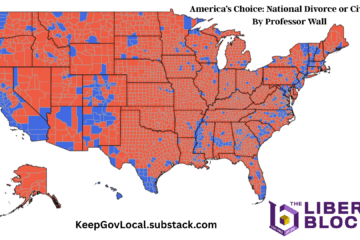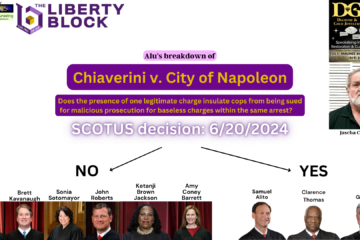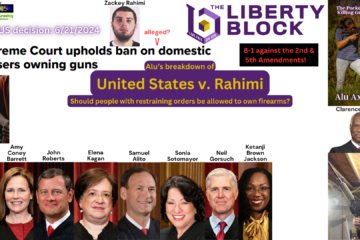I’m currently learning German in the comfort of my own home without paying a dime for lessons. I’m also working on improving my Spanish, and I’m getting my childhood Hebrew back. I’m using this same free education method to study medicine, chemistry, fitness, boxing, music, and many other subjects. I am doing all of this without paying any tuition – and without illegally using any programs or files. I am not stealing anything nor am I coercing or hurting a soul. Every single transaction in my educational journey is consensual and mutually beneficial to all parties involved. Not only am I attaining a free education, but every other party involved in educating me is gaining something that they consider valuable, as well. How could this possibly be?
Podcasts
I have only recently begun to utilize podcasts, and I find that they are extremely helpful. Unlike with YouTube, podcasts continue to play regardless of what my phone is doing, so I can throw it in my pocket and go about my day while learning. I subscribe to a few political, medical, and language podcasts, but I’ve mostly been listening to the Spanish ones recently. Of course, they are all free. I receive value in the form of free educational content. The creators earn money via ads, promotions, affiliates, and live-reads. Everyone is happy and nobody feels coerced. Podcasts are a great example of the beauty of spontaneous order and the ‘new free market’.
Duolingo
Created in 2011 by a Guatemalan-American entrepreneur who wished to provide free language education to everyone in the world, Duolingo is a free website and app that teaches many languages to speakers of many languages. I’m currently using it for Spanish, German, and Hebrew. The program is totally free and offers a premium option for a few dollars a month. I’m fine with the free version, for now. The site has easy and fun lessons that teach many new words and phrases via reading, writing, listening, and speaking. For popular languages like Spanish and German, there are also short stories that have small quizzes embedded throughout. I find the stories a little more enjoyable than the standard lessons, so I use both.
Website traffic
Nearly every one of the billions of websites on the internet has one primary objective: get as many website visits as possible. This objective accomplishes two important goals. The more visitors to the site, the more potential customers. People can’t buy your products if they don’t see them. And many who visit your site ‘just to browse’ may end up making a purchase. Second, the more visits a website has, the more money they can earn from advertisers. As mentioned above, the more eyes see your product, the more you can charge for advertisers to purchase or rent that virtual billboard.
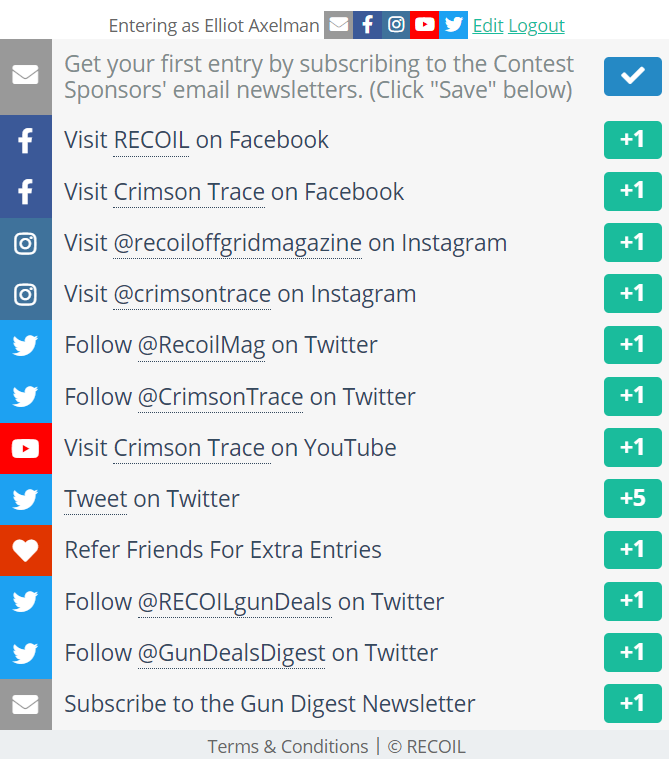
Considering the above economic infrastructure, businesses are willing to spend some money in order to get millions more visitors to their sites. So, they do just that: They team up with companies in adjacent industries and create large ‘giveaways’ which feature prizes (free guns, holsters, ammo, gift cards, etc.) in exchange for people fulfilling a few tasks. For each task they accomplish, they receive one (or more) entry into the raffle. The tasks include entering your email address (a valuable piece of information for marketing) and then visiting each company’s website and social media accounts. Giveaways range from cheap holsters to $15,000 firearms.
As we always see with the free market, all parties benefit from a transaction that nobody is coerced into. The companies receive exposure via advertising and visits to their websites. The customers learn about companies they are interested in and they get a chance to win products they enjoy. Everyone wins and nobody loses.
I had thought that maybe only the firearms industry does this, and then I saw this exact same method being used by the ‘Better Sax‘ YouTube Channel and saxophone company. That’s when this brilliant form of a the new free market hit me.
YouTube
I use YouTube for language lessons and to practice listening comprehension by finding videos on topics that interest me, such as sports, music, medicine, politics, investing, guns, etc. My favorite channels are Khan Academy, Osmosis, Medcram, Ninja Nerd Science, Crash Course, Demolition Ranch, Military Arms Channel, IraqVeteran8888, SpanishPod101.com, and others.
Over the past few years, free online education has exploded with popularity, primarily via YouTube. One Indian man created a leading free education platform when he was tutoring his cousin in mathematics in 2004. A hedge-fund manager, Salman Khan recorded videos for his cousin to watch on her own time. He was very good at explaining things, so his videos became popular. He continued making videos, and eventually brought on other expert instructors to make more videos. Today, Khan Academy’s YouTube channel has 5.7 million subscribers and has helped billions of people learn countless subjects for free. The site has since grown into quite a large online school, complete with personal profiles, classes, and many more free resources for students. Khan Academy is a non-profit which relies solely on philanthropy, and they seemingly do not utilize YouTube to run ads on their videos, which could earn them tremendous amounts of money. The school remains free to all learners.
There is an easier approach to free online education, though. Many YouTube channels do not want to rely on the generosity of others, so they rely on their greed and self-interest, which is the most fundamental of human behaviors. YouTube channels like MedCram and Osmosis give people high quality medical education for free. The instructors who create these videos clearly pour thousands of hours of hard work into their videos so that you and I can learn for free. Why do they do it?
Greed, as I mentioned, is the ultimate human incentive. Humans love money. We love value. We understand that time and resources are finite and that knowledge is valuable. So, we naturally desire to obtain as much valuable information and resources as possible while expending the least amount of time and resources we can. They may love medicine and they may love teaching and helping people, but money is what drives them – and allows them – to make these videos. Like you, I am greedy, so I don’t want to spend $50,000 each year and travel to a college to learn what I can learn for free from my couch.
Here is how it works: The better their videos, the more views their videos receive. The more views they attain, the more money YouTube can make by showing ads to viewers before, during, and after their videos. The creators receive a portion of the money YouTube earns from the business paying for the advertisement. And everyone is happy, and nobody is violated. And you and I get incredible education for free.
Decent YouTubers can earn $20,000-$30,000 in a MONTH. Nate O’brien is just one of many examples. He has 847,000 subscribers and gets a few million views on his videos, which discuss personal finance. He earns around a quarter of a million dollars per year from YouTube ads on his videos. The really popular YouTubers (and the attractive women) earn multiples of what Nate earns.
Below is a simple chart made by an untalented designer (me) which explains this process, which I have haughtily dubbed the ‘new free market’:
Other than perhaps surgery and a few other super-technical skills, you can learn damn near anything for free from the comfort of your own home. If you enjoy YouTube, Duolingo, podcasts, or other free education, you have spontaneous order and the free market to thank; not government officials or central planners.
UPDATE: In 2021, it seems that the state government of New Hampshire accepted my advice and began placing ads on their videos, generating revenue for the government without the use of force.
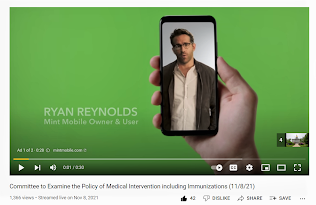
This same model is utilized across many other industries, including government agencies. But it should be used much more. I believe that if we embrace the new free market and the incredible power and efficiency of advertising, we could fund governments without any taxation whatsoever. Technology and human advancement have demonstrated that anything, from videos, to billboards, to buses & trains, buildings, and roads, can earn money for their owner. As long as people see it, it could be ‘rented’ to businesses who are willing to pay billions to advertise their products on your highly visible properties or online spaces. If they were able to, I’m sure that businesses would pay a few dollars to place their ads or logos on municipal roads, vehicles, and buildings. Imagine if the federal government streamed the State of the Union address (and every congressional hearing and vote) on YouTube or a similar platform. They would get hundreds of millions of views. This could translate to billions of dollars a year, which would be enough to fund even the federal government, especially if they trimmed some fat in their budgets. If we took it a step further, we could rent every square inch of the capitol to advertisers to fund the federal budget. I think that it could make so much money that the federal government would have a surplus, which they could use for welfare, to pay down the national debt, or to reimburse people like you and me for years of extortion via federal income taxes.
Think about it: Federal politicians already sell their souls to rich corporate interests (not to mention foreign governments) by way of lobbying and simple bribes. They are benefiting from big companies spending billions of dollars. Why shouldn’t ‘we the people’ benefit a bit from the companies’ expenditures, too? Instead of spending millions on buying politicians, maybe Boeing would pay a few million dollars to have their logo placed on a wall in the US Senate for a week. I would rather see a ‘Boeing’ logo on the Senate wall on C-Span than be extorted for $20,000 by Trump and Pelosi each year. Which would you prefer? Being taxed into bankruptcy or occasionally seeing some ads?
Considering how modern anti-freedom activists and authoritarian politicians claim that free-market capitalism is ‘outdated’, the truth is that they have it backwards. The free market and spontaneous order could never lose their value, because they are the essence of a free world, progress, and prosperity. Central planners like politicians, regulators, and judges never could have invented products or created business systems such as the one above; these things must develop naturally based on human greed – the same trait that politicians ironically promise to remove from society for good.
